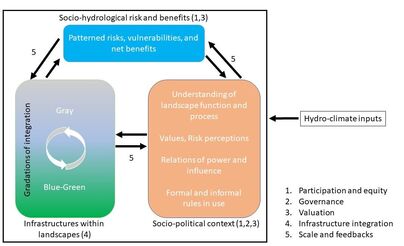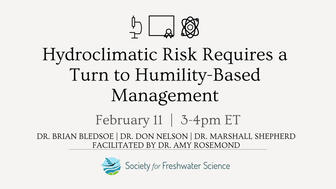|
The October 2020 issue of One Earth has a Voices piece addressing issues of transformative adaptation in cities. Read Don Nelson's and other climate change researchers' thoughts here. Or find it online: www.cell.com/one-earth/fulltext/S2590-3322(20)30489-9
0 Comments
 Check out the new publication on Nature-based solutions. Often promoted as game changers, NBS face a host of challenges for implementation, equity, and sustainability. This manuscript explores these challenges from a systems perspective, classifying challenges and highlighting current innovative solutions. Challenges to realizing the potential of Nature-based solutions. Donald R. Nelson, Brian P. Bledsoe, Suana Ferreira, Nathan P. Nibbelink. Current Opinion in Environmental Sustainability doi.org/10.1016/j.cosust.2020.09.001  Gabriela de Azevedo Reis, HECL alum and current PhD student at the Federal University of Ceará in the Department of Environmental Engineering, has a new publication in Natural Hazards. In the manuscript, Gabriela presents a drought index model that includes climatological, social, economic, and water management factors. The model is based on readily available secondary data and provides critical information on drought hotspots and the principal underlying factors. The model was tested at different spatial and administrative scales and in different biogeophysical contexts. See manuscript here. Don Nelson and UGA collaborators Brian Bledsoe and Marshall Shepherd have a new publication that underscores the importance of scientific humility in addressing hydroclimatic challenges in the 21st C. The article highlights three areas that need to be simultaneously addressed to reduce risk and promote equitable and sustainable risk management: Humans as a part of nature; Engineering with a dynamic nature; and, Acknowledging complexity. Nelson, D.R., Bledsoe, B., and M Shepherd. 2020. From hubris to humility: Transcending original sin in managing hydroclimate risk management. Anthropocene. doi.org/10.1016/j.ancene.2020.100239. Lab member John Ryan McGreevy and colleague Kevin Colburn (American Whitewater) recently completed a report that analyzes congestion and interaction between different types of visitors along the Upper Chattooga River Wild and Scenic River Corridor. McGreevy presented preliminary findings at UGA’s Integrative Conservation Conference in February. The authors have since submitted the completed report to members of the USDA Forest Service and advocacy groups for different visitor types. This report adds to a decades-long discussion on how to manage the Chattooga River in ways that protect the natural environment and maintain wilderness experience for visitors. Novel insights from McGreevy and Colburn’s analysis of six years of data on river use, river flow, and rainfall will hopefully contribute to adaptive management and inform future policy formation.
Read the full report here. Shelly's insightful piece on the ways that rural populations in Kentucky and Northeast Brazil are challenging marginalization and discrimination is now available to read in Anthropology News.
https://www.anthropology-news.org/index.php/2020/02/24/radical-media-challenges-rural-stereotypes/ Don and John McGreevy were co-authors on a recent publication in Environmental Research Letters - "Advancing the integration of ecosystem services and livelihood adaptation"
The paper evaluates limitations of mainstream conceptualizations of ecosystem service flows, and discusses methodological tools and emerging research from multiple disciplines that can help overcome those limitations. We present a research framework that integrates ecosystem service analysis with principles from Sustainable Livelihood Analysis and the rapidly emerging field of adaptation studies in social-ecological systems. Coupling these complementary approaches can give more holistic and realistic understandings of ecosystem service flows and who benefits from them. King, E. G., D. R. Nelson, and J. R. McGreevy. 2019. Advancing the integration of ecosystem services and livelihood adaptation. Environmental Research Letters 14:124057. Open Access: https://doi.org/10.1088/1748-9326/ab5519 Mike Coughlan and Don Nelson have a new publication out in JAS. The "Geostatistical Analysis of Historical Contingency in Land Use Footprints in the Prehistoric Settlement Dynamics of the South Carolina Piedmont, North America" continues the exploration of land use legacies within the Calhoun Critical Zone Observatory. The paper demonstrates that beginning with the ceramic period, historical contingency explains settlement patterns better than solely looking at topographic and land form characteristics. Linked with our earlier published analyses, we begin to see direct links between ceramic period and contemporary land use patterns in South Carolina.
https://doi.org/10.1016/j.jas.2019.04.003 Mike Coughlan and Don Nelson recently published "Influences of Native American Land Use on the Colonial Euro-American Settlement of the South Carolina Piedmont".
The article argues that localized prehistoric land use legacies likely helped structure the long term, landscape- to regional-level ecological inheritances that resulted from Euro-American settlement. Open Access: https://doi.org/10.1371/journal.pone.0195036 John McGreevy and Don Nelson are co-authors on a manuscript in Food Security. It is an outcome of a series of workshops convened by the Climate Change, Agriculture and Food Security CGIAR Research Program. The paper presents set of methodological indicators to study food systems governance.
https://doi.org/10.1007/s12571-018-0770-y |
HECLAB newsLearn about what we have been up to. Archives
February 2024
CategoriEs
All
|
 RSS Feed
RSS Feed